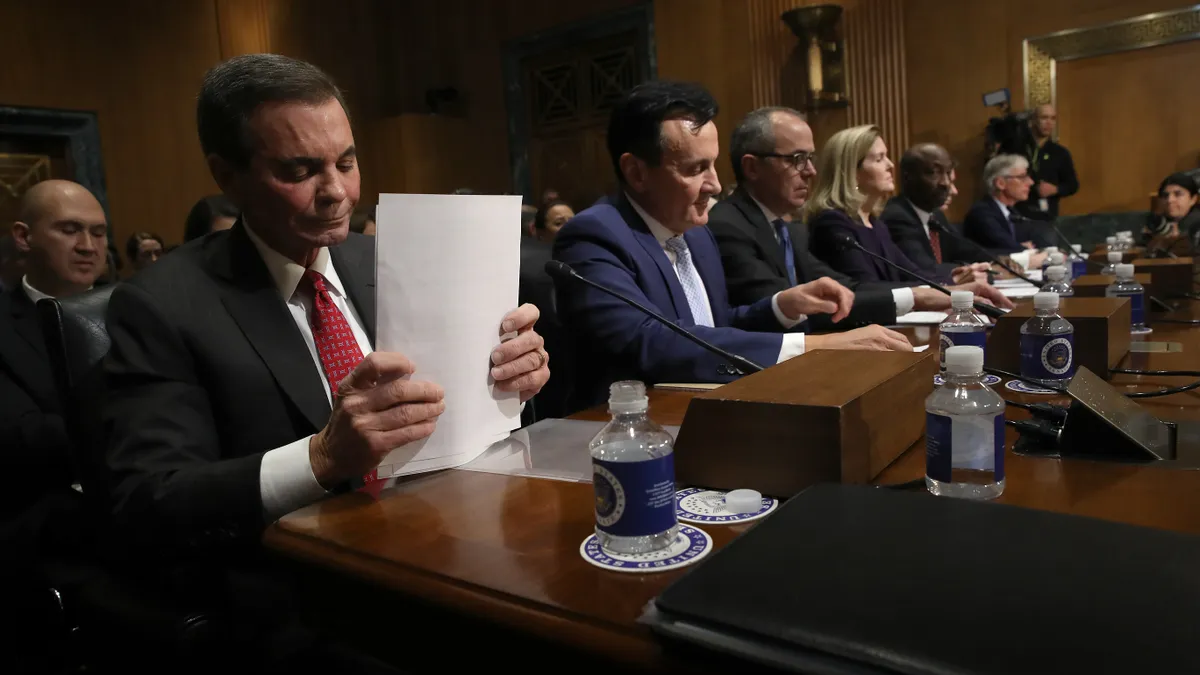Dive Brief:
- Senate Finance Committee Chair Ron Wyden, D-Ore., launched an investigation into the global tax practices of AbbVie, asserting that the pharmaceutical company used the 2017 changes in federal taxation and overseas havens to reduce its tax rate from 20% in 2016 to a 9.5% average from 2018 to 2020.
-
The committee probe will focus on how the 2017 law, passed with overwhelming Republican support, allowed AbbVie “to further abuse tax havens and avoid paying taxes on U.S. prescription drug sales.”
- “Instead of using the massive tax cuts given to AbbVie by the 2017 tax law to reduce drug prices for American families, AbbVie has instead chosen to provide a $10 billion windfall to investors by substantially increasing the amount of money it spent buying back its own stock,” Wyden said in a June 2 letter to AbbVie CEO Richard Gonzalez.
Dive Insight:
The Trump administration’s tax changes cut the total tax bill for AbbVie, and other large U.S. pharmaceutical companies, during the past four years by more than $6 billion, according to an analysis by BioPharma Dive.
President Joe Biden, supported by Democratic lawmakers, wants to reverse parts of the 2017 law and increase the tax obligations of pharmaceutical and other companies.
Higher revenue would help fund ambitious federal programs proposed by Biden, including $2 trillion in infrastructure spending known as the American Jobs Plan.
The Biden administration is moving across a broad front. It has proposed raising the corporate tax rate to 28% from 21% and the minimum tax on the foreign profits of U.S. companies to 21% from 10.5%.
The administration intends to strengthen enforcement and increase corporate and individual tax revenue by $700 billion over the next decade, in part by increasing the budget for the IRS by $80 billion during the same period, according to a U.S. Treasury Department plan.
Treasury Secretary Janet Yellen aims to discourage the use of foreign tax havens by securing a global minimum corporate tax rate of at least 15%.
Yellen has pledged to work with other countries “to end the pressures of tax competition and corporate tax base erosion.” She plans to call for an agreement on a minimum tax rate at a two-day summit of the Group of Seven finance ministers in London beginning tomorrow.
A minimum rate would ensure “the global economy thrives based on a more level playing field in the taxation of multinational corporations, and spurs innovation, growth and prosperity,” Yellen said in an April 5 speech.
Wyden said “AbbVie has been able to successfully exploit the incentives to offshore profit included in” the 2017 tax law.
“Despite the United States market being the source of most of AbbVie’s revenues and richest price premiums, it appears that the company has consistently reported net losses in the United States while reporting substantial foreign profits,” he added.
AbbVie did not respond to phone and email requests for comment.
The Treasury Department, citing data from the Joint Committee on Taxation, noted in 2018 the effective tax rate on profits of U.S. multinationals was just 7.8% compared with an average of 8.7% and 18.1% among the European Union and the top 10 U.S. trading partners, respectively.
The U.S. collects less in corporate taxes as a share of gross domestic product (GDP) than most other advanced economies in the Organization for Economic Co-Operation and Development, according to the Treasury. Since the approval of a tax cut package in December 2017, corporate tax revenues have fallen to 1% of GDP from 2%.












